What Do You Feed Your Chickens in
Raising chickens is a fun and rewarding experience. When you spend time with your birds, you'll get to know their individual personalities. Sometimes they'll even eat out of your hand! And just like people, your chickens will appreciate some variety in their diets. If you've been wondering what to feed chickens, you've come to the right place.
The Right Type of Feed
Before delving into the treats you can give your birds, you'll need to make sure you're giving them the right kind of feed. If you're starting out with baby chicks, it's important to give them chick starter/grower. This type of feed is intended to make sure they get all the nutrition they need.
After about 18 weeks, you'll need to switch them over to layer feed. This feed is made for adult birds and has enough calcium to support laying hens. Make sure you do this gradually–switching feeds abruptly can result in upset stomachs.
1. Scratch Feed
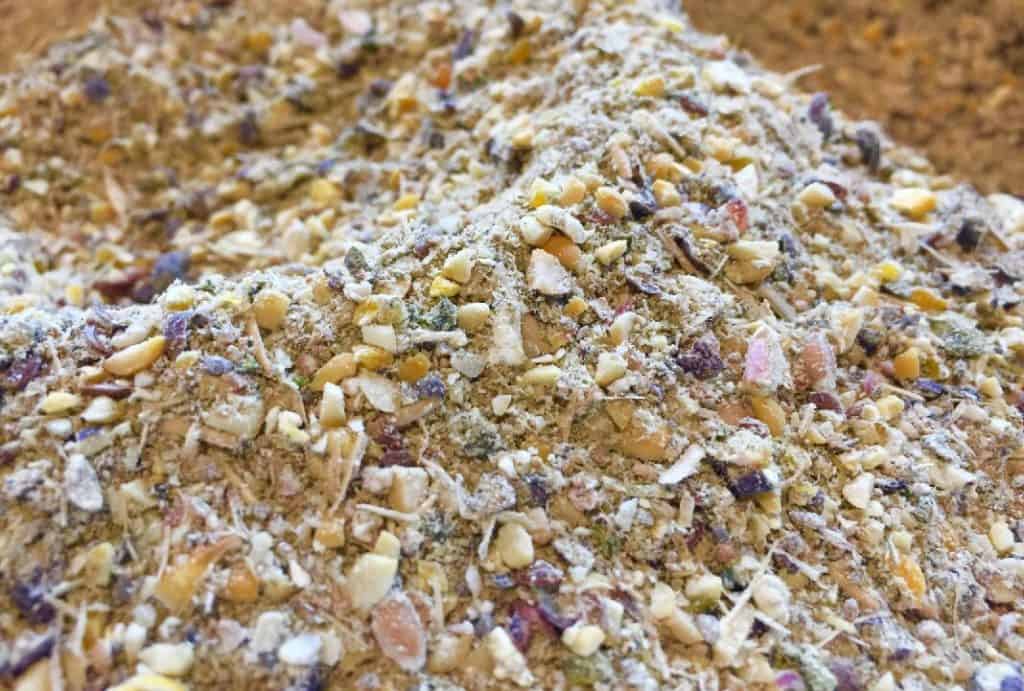
Scratch feed is a mixture of different grains and seeds–it usually contains wheat, cracked corn, barley, and sunflower seeds. It gets its name because chickens will peck and scratch to get to it. Scratch feed can encourage chickens to forage, and it's great for reducing boredom.
However, scratch feed is not a replacement for proper chicken feed. It's a nice treat and can encourage your birds to get more exercise, but your birds won't be healthy if all they eat is scratch. Make sure you don't overdo scratch, either. Corn can be fattening when fed in large amounts. You also don't want your birds to avoid their regular feed in favor of scratch feed.
2. Mealworms
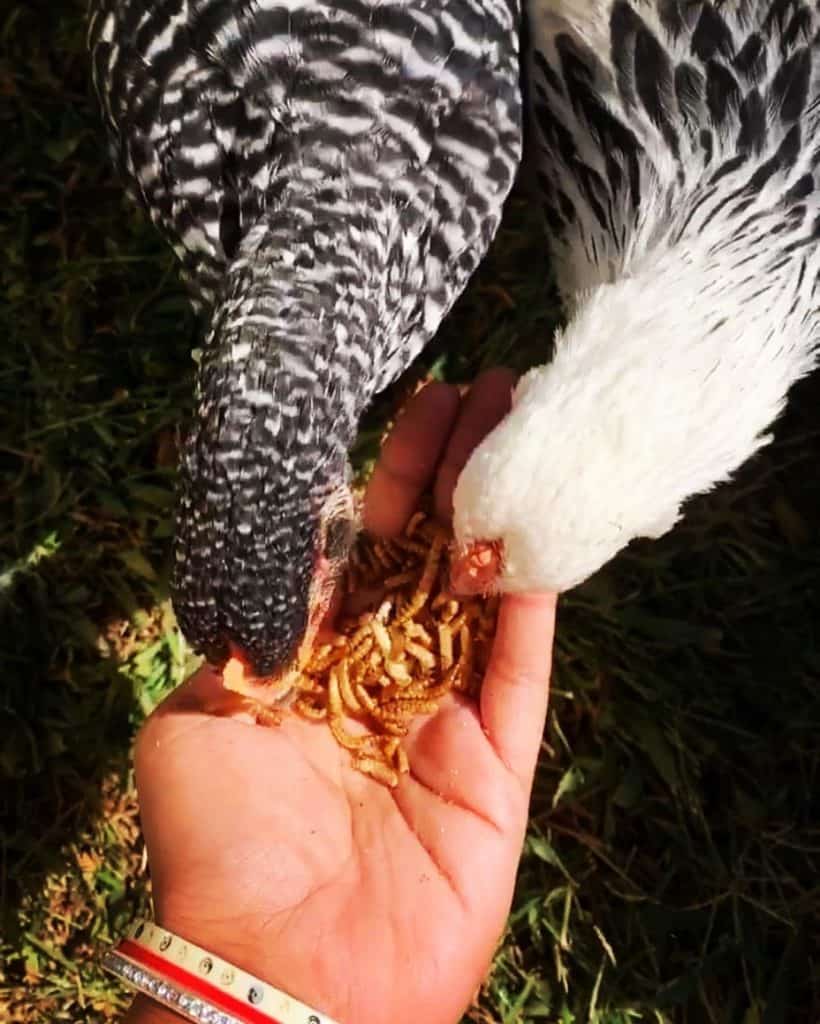
It might sound odd to buy bugs to feed your chickens. But mealworms are a great source of protein. A little protein boost can do a lot for your chickens, especially during molting season–it can help them grow feathers back faster.
You don't need to buy live, wriggly mealworms to feed–dried mealworms will do just fine. And while they're healthy in small amounts, don't overdo it!
Mealworms are also high in fat, and they're about 50 percent protein. An adult chicken's diet should only be about 16 percent protein, so you won't want to make mealworms a staple–between one and 10 mealworms per bird is plenty.
If you want to build a mealworm, you can read our article: 10 Mealworm Farm Plans You Can DIY at Home.
3. Cooked Oatmeal
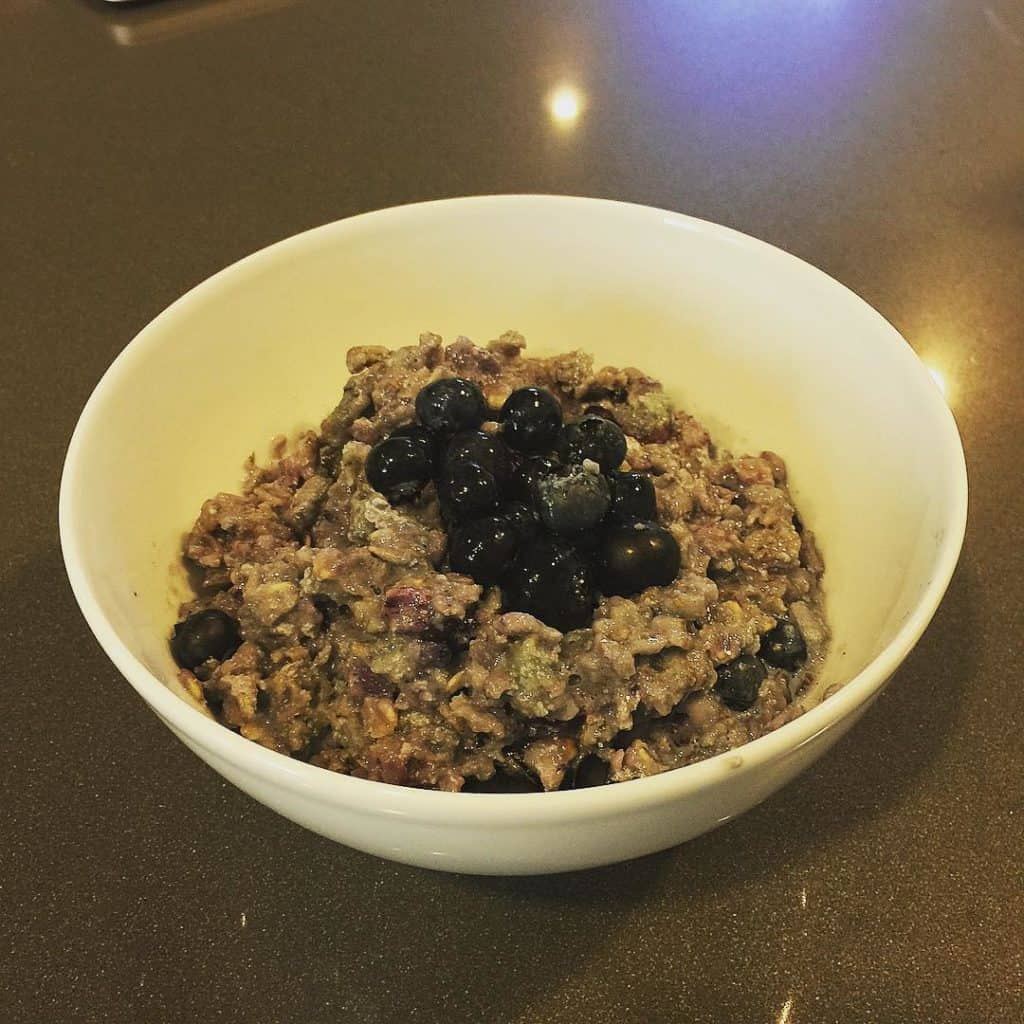
When you think about what to feed chickens, oatmeal probably isn't what first comes to mind. But oats are a major ingredient in chicken feed, so it makes sense that chickens like oatmeal, too. Warm oatmeal can be a great snack for them, especially in winter. There's even been a USDA study showing that oatmeal improves general health in chickens.
Oatmeal is rich in protein and plenty of micronutrients that will keep your birds healthy. For a special treat, you can even cook it with fruit or stir in some of the dried mealworms mentioned above.
4. Bread
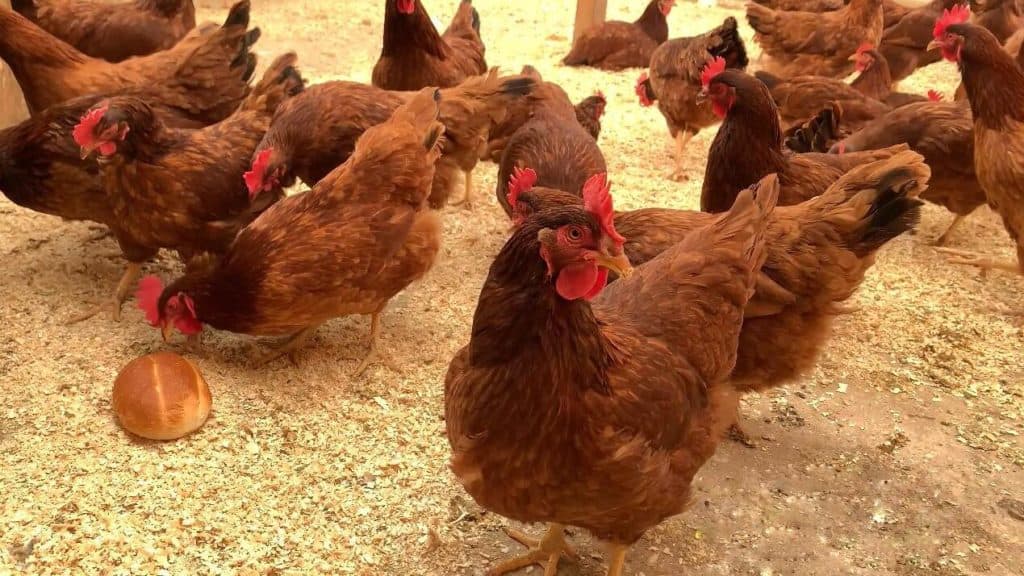
When offering chickens treats, it's important to only give starches in moderation. However, bread is a popular treat among many chicken keepers. Feeding your pet chickens bread is a great way to get rid of stale bread. Make sure it isn't moldy, though–mold can make your chicken sick.
Bread isn't the healthiest thing on any list of what to feed chickens. Whole grain breads will provide more nutrients and energy. But even white bread is fine to offer as a treat once in a while.
5. Berries
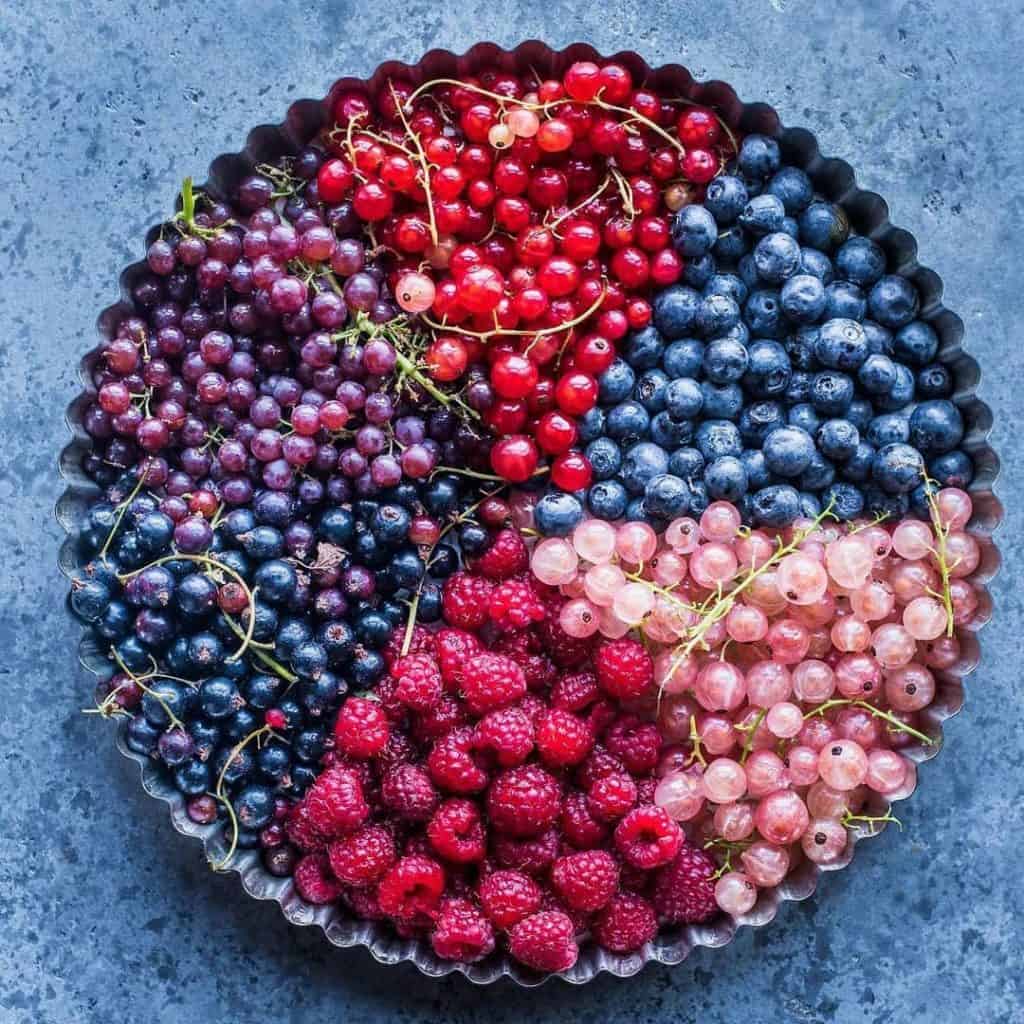
Berries, and especially strawberries, are a major treat for chickens. They taste sweet and can give your birds an energy boost. Berries are also rich in antioxidants and vitamins. Even if you have a picky flock, almost any chicken will jump at the chance to eat some blueberries or strawberries.
If you have space, you can even plant berry bushes in the area where your chickens roam. They can jump up to get berries off the limbs. This may not be possible for everyone, but it's a great way to add new dimensions to their foraging.
6. Yogurt
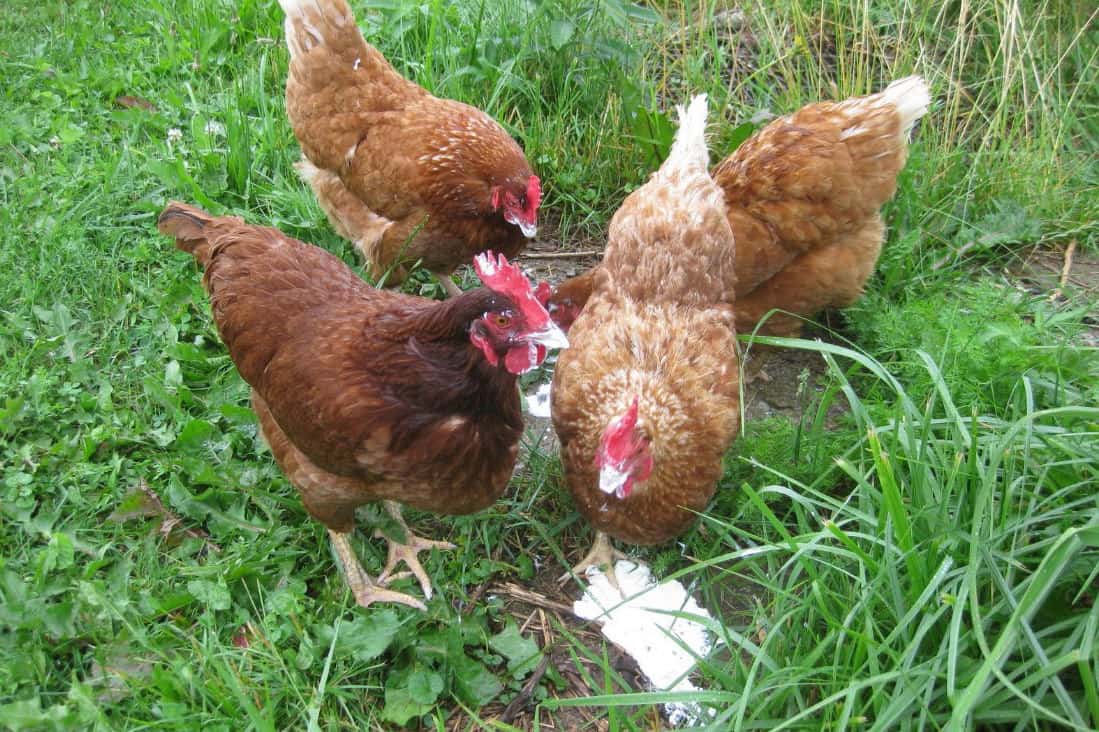
When asking what to feed chickens, you probably wouldn't think of yogurt. However, yogurt has lots of helpful probiotics that aid indigestion. Yogurt is also rich in calcium, making it a great treat for laying hens. Some types (like Greek yogurt) also have a lot of protein.
However, when feeding yogurt, stick to plain, unsweetened varieties. Sweetened yogurts often have a large amount of sugar, and it's best to keep chicken treats as healthy as possible. An occasional taste of sweetened yogurt shouldn't hurt.
7. Apples

Apples make excellent chicken treats, and they're rich in vitamins. You can cut up apples into small cubes. If you peel apples for use in cooking, you can also offer peels to your birds–they'll love them!
There's some disagreement over feeding apple cores, though. It's true that apple seeds contain cyanide. However, most chicken keepers seem to agree that there isn't enough present to kill birds. Others believe the cyanide in the cores makes them unsafe to feed. If you want to be safe, you can always remove seeds from each core before giving it to your flock.
8. Pumpkin
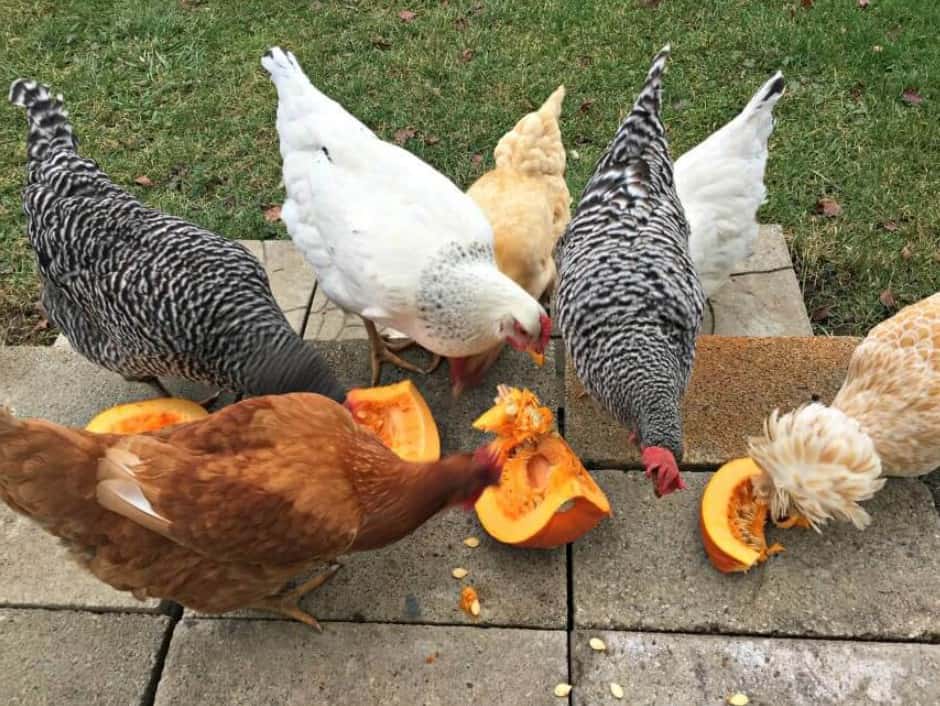
When you're deciding what to feed chickens, make sure to consider pumpkin. Pumpkin is a food that they can safely enjoy cooked or raw. For an especially easy dietary supplement, you can even offer them scoops of canned pumpkin.
You don't just have to stick to the squash itself–pumpkin seeds are also safe to feed. Try to avoid commercially packaged seeds, as these usually contain high levels of sodium.
Pumpkin seeds act as a natural dewormer, and they work best raw. If you're making pumpkin soup or carving a jack-o-lantern, try chopping raw seeds and giving them to your birds. You can also stir chopped seeds in with their feed.
9. Leafy Greens
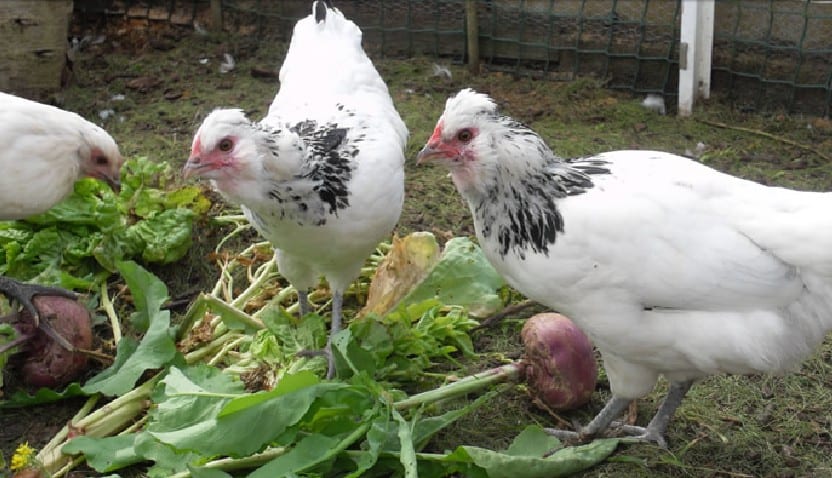
If you've ever seen chickens roaming freely, you know they enjoy a variety of green foliage. If you want to offer some variety and more nutrient-rich options, try feeding them leafy greens. Kale, spinach, collards, turnip greens, and chard are all great choices.
Chickens probably won't immediately gravitate to greens as they do to sweet foods like berries or dense starches like bread. However, greens can add some interest, especially to confined birds.
If your chickens are in a coop, try hanging bundles of greens inside. This will give them something to peck at, and the motion of a hanging bundle makes foraging a little more challenging.
Darker leafy greens also have benefits for you. Because they are so full of nutrients, they lead to brighter, richer yolks.
10. Cold Watermelon
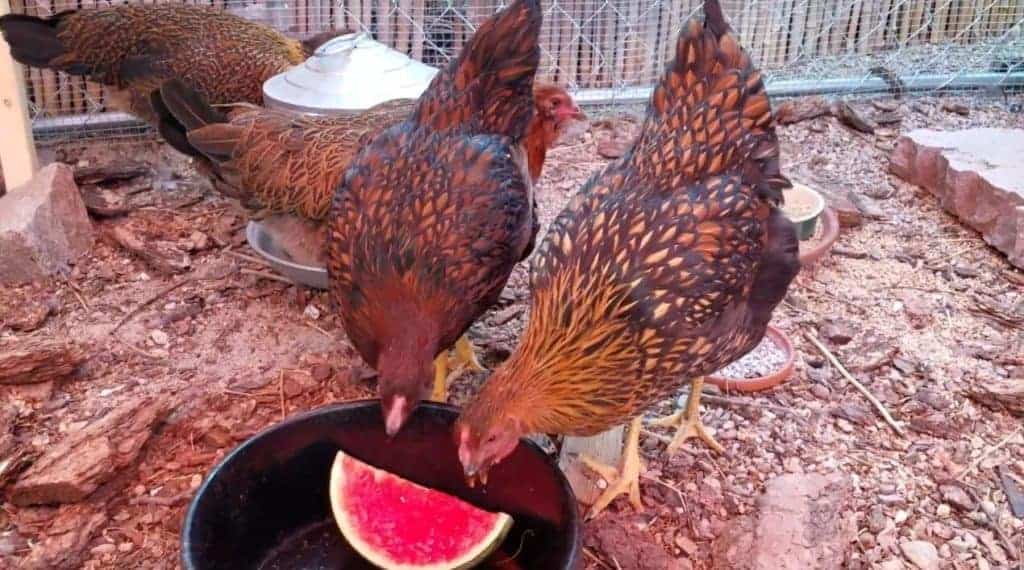
When deciding what to feed chickens, make sure you take the season into account. Chickens are generally hardy animals, but they sometimes find very hot weather difficult. This is especially true for large, heavy breeds like Cochins and Brahmas.
Shade and cold water can help chickens deal with the heat. But if you want to give them some variety, try offering cold watermelon. The seeds and fruit are safe for them to eat. And because of the high water content, it will help keep them hydrated.
11. Cottage Cheese
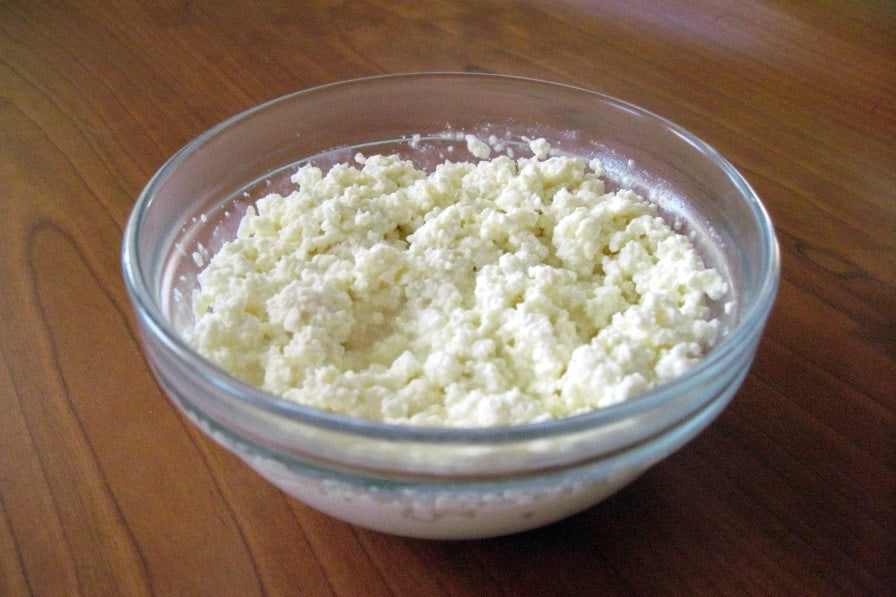
Sometimes, it can be fun to give your chickens something different. And if your birds are prone to boredom, they'll appreciate being able to try new things. If you like cheese (and who doesn't?), you might be wondering if it's safe for chickens to eat.
Cheese is made primarily of fat and protein. Chickens need some of each in their diet, but you'll want to be careful to avoid overfeeding. While you can give your birds small amounts of any type of cheese, the healthiest option is cottage cheese. It can be a little messy to eat, but it has less fat than traditional sliced cheese, making it a more balanced dietary choice.
Cottage cheese also has plenty of calcium, so it's a treat that will help your laying hens with egg production, too. If you want to give your flock something extra, you can add sliced fruit or berries.
Many flock owners offer slightly old food to their birds. This is usually safe, but make sure that any cottage cheese you offer isn't moldy. Mold is toxic to chickens and can make them sick. Make sure you remove any uneaten cottage cheese and refrigerate it, especially in warmer weather.
12. Tomatoes
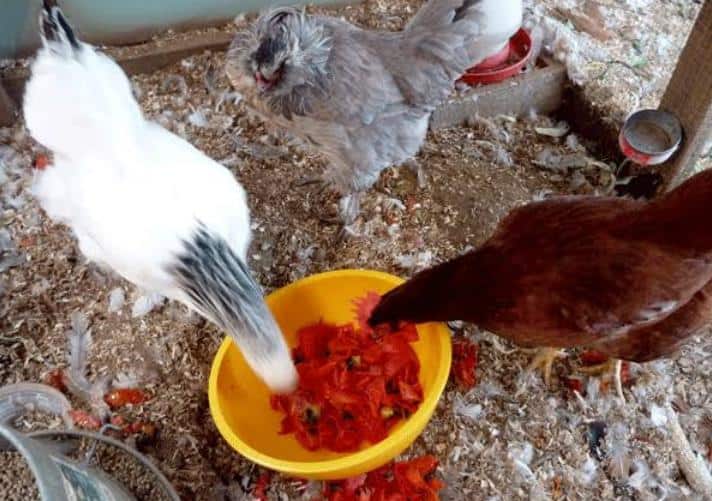
When considering what to feed chickens, a lot of chicken keepers choose something easy. With a few exceptions, chickens can eat most things you do. So if you're slicing tomatoes for a salad or sandwich, don't be afraid to offer them some.
Tomatoes are an especially fun treat for chickens. Between the many small seeds and larger chunks of flesh, tomato slices will keep your flock busy for a while.
13. Grapes
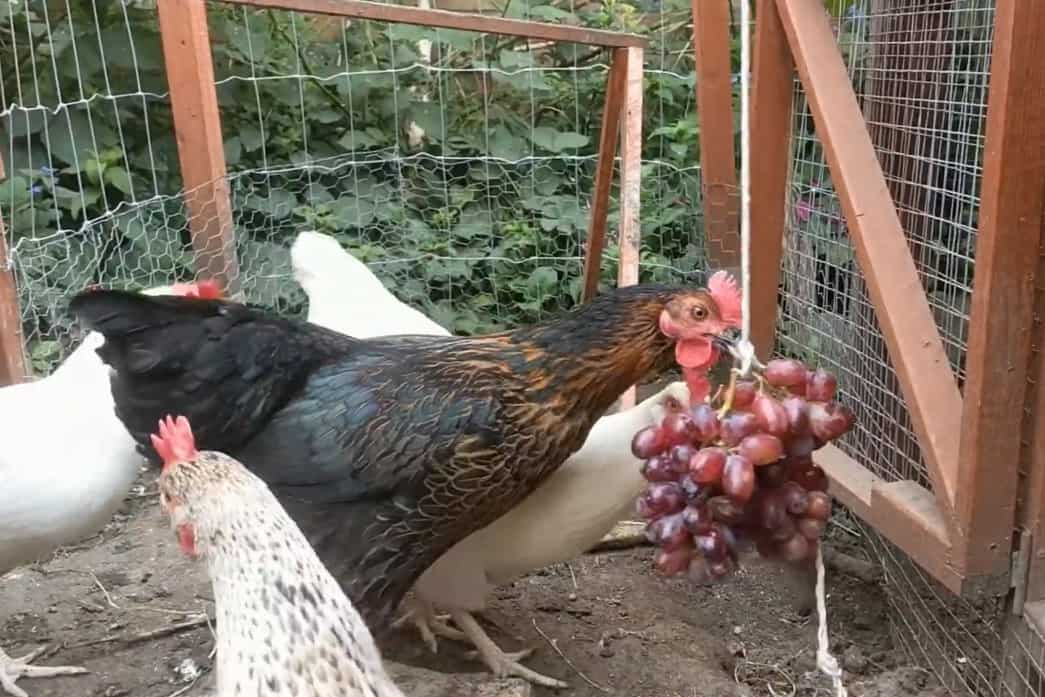
Grapes are a lot of fun to feed chickens. You might even catch them playing keep-away with each other. If your birds are picky about treats, this is a great treat to try. Most chickens seem to love them and gravitate towards them.
If you're feeding grapes to smaller chickens or chicks, it's a good idea to slice them. This will reduce their risk of choking, and it also makes the grapes a little easier to eat.
14. Eggs
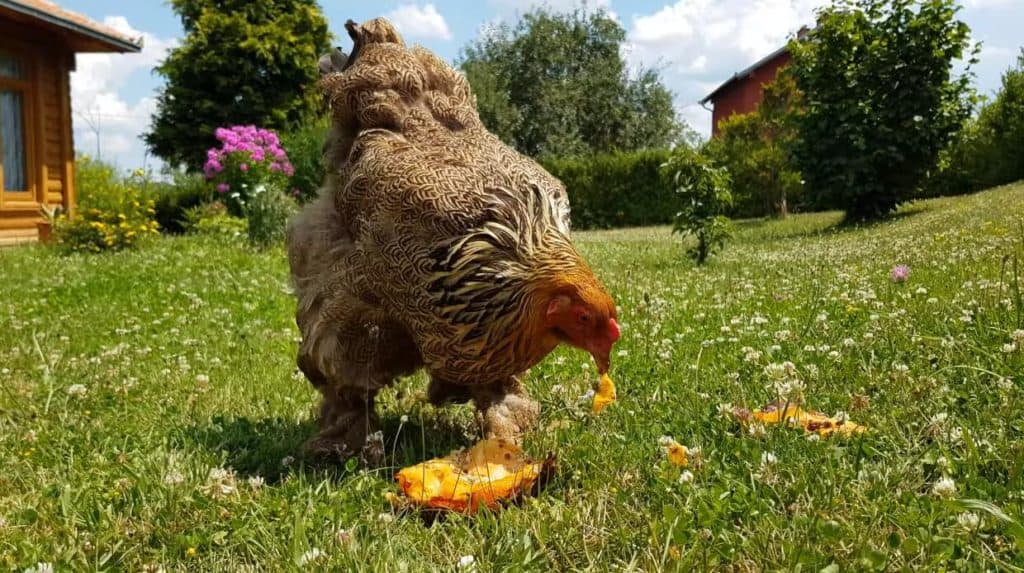
Eggs are probably the last thing you'd think of when choosing what to feed chickens. It might seem counterintuitive and even slightly wrong to feed eggs to chickens. However, egg yolks are the food source for developing baby chicks. Adult chickens can benefit from the protein and healthy fats found in eggs.
If you feed your birds eggs, there is one precaution you should take. Make sure any eggs you feed them are scrambled (ideally without much oil or butter) or boiled. If you feed raw eggs, you run the risk of your hens starting to eat their own eggs. This is a very hard habit to break. It also cuts down on the number of fresh eggs you can gather each day.
15. Cooked spaghetti
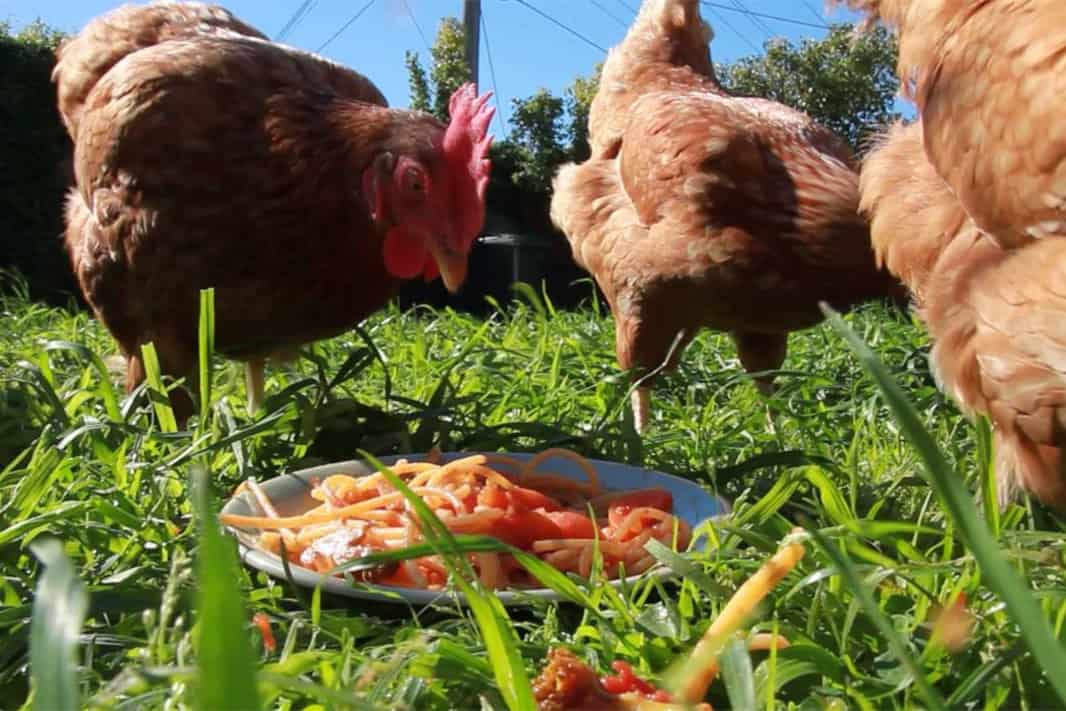
Nutrient-dense foods are usually the most important when it comes to deciding what to feed chickens. And while you should usually choose nutritious foods, chickens enjoy occasional junk food. If you cook spaghetti plain, it's safe for chickens to eat. Longer noodles can encourage chickens to move more as they chase down one another for a bite.
As with most starches, you'll want to keep this one to a minimum when feeding. But if you want to be entertained while watching your birds eat and want to give them something to do, this is a great treat. Make sure any pasta you prepare for chickens is made without salt since too much sodium isn't healthy for chickens.
16. Herbs

You probably don't want to feed all of your freshly-grown herbs to chickens. But if you have leftovers, herbs can be a fun treat for your chickens. They also have some health benefits. For instance, mint can lower body temperature slightly, making it ideal to feed in the summer.
If you have space to add plants to where your chickens roam, consider adding a few herbs. These are plants that grow easily and don't need much upkeep. They can add variety to your birds' foraging choices, and you can trim them when you need herbs for your own cooking.
Summary
Knowing what to feed chickens is important, especially if you want to give your birds snacks and treats outside of their normal diet. By offering healthy, nutritious additions to their diet, you can make your chickens' days a little brighter.
Source: https://cs-tf.com/what-to-feed-chickens/
0 Response to "What Do You Feed Your Chickens in"
Post a Comment